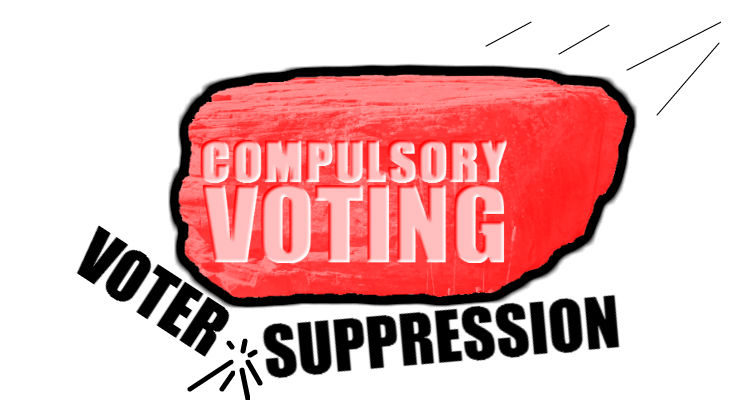 There are various types of barriers facing voters including photo ID requirements, voting booth availability, the flexibility of poll hours, and the availability of time off from work with pay for voting. Some states even have financial penalties for the violation of deadlines or rules related to registration lists. Online voter registration, absentee voting, and early voting are some policies that clearly are shown to ease voting. Compulsory voting, however, is a policy that can end voting barriers forever. There was an interesting new post on the subject of compulsory voting written by Ken Dixon and published in the Connecticut Post. Take a look at this excerpt:
There are various types of barriers facing voters including photo ID requirements, voting booth availability, the flexibility of poll hours, and the availability of time off from work with pay for voting. Some states even have financial penalties for the violation of deadlines or rules related to registration lists. Online voter registration, absentee voting, and early voting are some policies that clearly are shown to ease voting. Compulsory voting, however, is a policy that can end voting barriers forever. There was an interesting new post on the subject of compulsory voting written by Ken Dixon and published in the Connecticut Post. Take a look at this excerpt:
What would it take to get you to vote in the next election? How about a $20 fine if you neglected the civic duty? Mandatory voting with a potential monetary penalty is just one of about 30 election-related bills that have been submitted to the General Assembly this session.
Another bill, proposed by conservative lawmakers, could end the state’s Election Day registration law. Another would apportion the state’s electoral votes by counties like Iowa, although Connecticut has eight counties and only seven electoral votes. Still another Republican bill, apparently inspired by the unfounded claims of fraud in the recent presidential race, would require further authentication of voter signatures on absentee ballots.
Read more here. Some interesting related research was published in the Election Law Journal where authors Quan Li, Michael J. Pomante II, and Scot Schraufnagel outline an innovative voting index system in their report titled “Cost of Voting in the American States”. The index helps reveal amazing data on how voting barriers vary by state.
According to the index’s findings for 2016, “voting was most difficult in Mississippi and… voting was easiest in Oregon, which was the only state to make use of automatic voter registration in 2016”. TheConnecticut Non-Voters poor state of Mississippi’s democracy should be a surprise to no one. Mississippi has no online voter registration system, no same-day voter registration, and no early voting. Photo ID is required. As a result of state voting laws, this year “little more than 13 percent of Mississippi’s registered voters (245,100 people) cast ballots in the June Republican and Democratic primaries”.
As covered on Democracy Chronicles, there are many unexpected factors that research suggests affects US voter turnout. Influencing factors include things like cigarette smoking, wind speed, rain, bad weather forecasts, boredom, and delayed onset adulthood. This type of research is highlighted in the Democracy Chronicles Election Science archives as well as other important research in political science as it relates to democracy, the ultimate invention in political science.
Also, see related Democracy Chronicles articles like those on the Voter Access, Voter Turnout, or even seen our section on American Democracy.
Leave a Reply